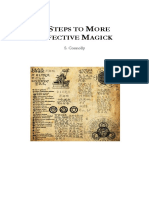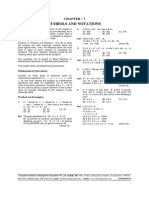Manual For Living
Manual For Living
Uploaded by
Anonymous RdNPx2Nd2Copyright:
Available Formats
Manual For Living
Manual For Living
Uploaded by
Anonymous RdNPx2Nd2Original Title
Copyright
Available Formats
Share this document
Did you find this document useful?
Is this content inappropriate?
Copyright:
Available Formats
Manual For Living
Manual For Living
Uploaded by
Anonymous RdNPx2Nd2Copyright:
Available Formats
The Manual for Living
by Epictetus (55-135)
Chapter 1 a) Happiness and freedom begin with a clear understanding of one principle: some things are within our control and some things are not. If we are not able to make this distinction, we will meet with disappointment and frustration, grief and worry. But if we have the right idea about what really belongs to us and what does not, we will experience freedom. b) Be aware that to really understand these ideas, a casual effort is not sufficient. c) From now on, practice saying to everything that appears unpleasant: is this problem within my own control or is it not? If it concerns anything outside your control, teach yourself not to worry about it.
Chapter 2 We live our life under the influence of our likes and dislikes. Likes command us to run and get what we want. Our dislikes push us to avoid what we dont like. If we dont get what we want, we are frustrated; and when we experience what we dont want, we are unhappy. But if we direct our aversion only to things that are under our control we will not have to do anything we dont want. But if we try to get away from inevitabilities such as sickness, death or misfortune, over which we have no control, we will make ourselves and those around us suffer.
Chapter 3 There are many things in life that make us happy, give us delight, are useful, or are deeply loved. We need to remember to tell ourselves what is their nature, beginning from the most insignificant things. If, for example, we are
fond of a specific cup we can, once in a while, remind ourselves that it is only a cup; then, if it breaks, we will not be so disturbed. When giving our child, husband or wife a kiss, we need to remember we are kissing a mortal, thus, there will be more understanding should anything happen to them.
Chapter 4 When you have something that needs to be done, mentally prepare for what the action involves. If you are heading out to bathe, imagine the typical scene at a bathhouse: people splashing, pushing, yelling and steeling your clothes. You will do what you have to do better if you say to yourself from the beginning: I want a bath, but at the same time, I want to keep my will in harmony with nature.
Chapter 5 We are disturbed not by things, but rather by the views we have regarding those things. It's not what happens to us, but how we react to it that matters.
Chapter 6 We should not pride ourselves about anything except what really belongs to us. What belongs to us? The intelligent use of impressions.
Chapter 7 If I am a sailor onboard a ship that makes port, I may decide to go out to bring some water. Along the way, I may stop to collect some shellfish or some exotic plant. However, my thoughts and continual attention ought to be bent towards the ship, waiting for the captain to call on board; and when he calls, I must be able to drop everything and return. So it is in life. If, instead of shellfish and exotic plants, I have been given possessions, so much the better. But when the captain calls, I must be prepared to leave them behind.
Chapter 8 Don't expect that events will turn out the way you want. Understand that they can only happen the way they do, and you will flow with life.
Chapter 9 Sickness is a problem for the body, not my problemunless I decide that it is my problem. Lameness too, is the bodys problem, in particular, a problem for the leg, but not mine. Say this to yourself whatever happens and you will always find that these situations may be a problem to something else, but not to you.
Chapter 10 For every challenge we encounter, we are also given the opportunity to turn inward and to call for our own hidden inner resources. Every trial we face can and should introduce us to our own strengths.
Chapter 11 Nothing can truly be taken from us because nothing truly belongs to us. Inner peace begins when we stop saying of things: I have lost it"; but instead we can say, It has been returned. But the person that took it was a thief! What difference is it to you who the giver assigns to take it back? While he gives it to you to possess, take care of it, look after it as something for you to enjoy; but don't view it as your own, just as a traveler sees a hotel.
Chapter 12 An important sign of a higher life is inner serenity. In order to acquire this, it is necessary to buy tranquility and peace of mind by choosing a wiser response to whatever happens.
Chapter 13 Dont try to impress others. Just be yourself. Keep your will in agreement with nature.
Chapter 14 It is foolish to want your family or friends to be immortal; it calls for powers beyond your possibilities. It is equally nave to expect everybody to be honest and kind. If it is freedom you wish, then wish nothing and reject nothing that depends on others, or you will remain an unhappy being.
Chapter 15 Remember to act always as if you were at a fine dinner party. When the food or drink comes your way, reach out and take some politely. Do they pass by you? Don't try to stop them. And if they have not reached you yet, dont let your desire run ahead of you, be patient until your turn comes. Adopt a similar attitude with regard to children, wife, wealth and status, and you will eventually be a worthy guest the feasts of the gods.
Chapter 16 Whenever you see someone in tears or upset because they are far from a loved one or worried because they have met with some material loss, be careful in allowing the belief that their circumstances are truly bad. Understand that they are not upset because of what has happened, but because of their view about what happened. Although we can show them kindness and validate their feelings we should not indulge in their suffering least we allow ourselves to get lost in their pain.
Chapter 17 Remember that you are an actor in a play of such a kind as the author chooses. If He wants the play to be short, it will be short; if long, it will be long. If He chooses you to play a poor, or a cripple, or a king, or a commoner,
see that you act it well. For this is your business, to act well the part given to you; but to choose it, belongs to another.
Chapter 18 When a raven has croaked inauspiciously, do not be concerned. Rather, make immediately a distinction in your mind and say, None of these things hold any significance for me; they may affect my body, property or reputation, but to me every sign is auspicious if I want it to be, because, whatever happens, I can derive some benefits from it.
Chapter 19 Real happiness is always independent of external conditions. Because of this, there is no place for jealousy or envy and one will not care about their position in societyonly about being free. And the way to be free is to understand our independence from possessions.
Chapter 20 Remember, it is not enough to be hit or insulted to be harmed, you must believe you are being harmed. If a situation irritates you, you must know that it is your own opinion which has irritated you, and not the situation.
Chapter 21 Instead of closing our eyes to the painful events of life, we need to acknowledge their existence and contemplate them often. By facing the realities of old age, disappointment, infirmity, loss and death we free ourselves of illusions and false hopes, avoiding excess.
Chapter 22 Give importance only to what you know is essential and superior, regardless of what other people think or do. Hold on to your truth, no matter what is going on around you. Commit yourself to your higher understanding of life.
Chapter 27 Whenever anyone criticizes or wrongs you, remember that they are only doing or saying what they think is right. Evil is not a natural part of the worlds design.
Chapter 28 If a stranger starts to handle your possessions, you would certainly not like it. Arent you ashamed that you allow your understanding to be confused by anyone who happens to criticize you?
Chapter 31 The essence of truth lies first in holding correct opinions and attitudes about the higher orders of existence: that life is not a series of random, meaningless episodes, but an ordered, elegant whole that follows ultimately comprehensible laws.
Chapter 32 If you are interested in knowing about your future, know that this can be approach(ed) in ignorance or in wisdom. In the first case the future would be approached with fear, hope, desire and aversion. In the second case it would be approached with the understanding that nothing outside of ones own influence can be either good or bad; and so at each moment the question would arise: whats the right thing to do now? irrespective of their consequences.
Chapter 33 Settle on the type of person you want to be and stick to it, weather alone or in company. a) Appreciate silence. When you are called to speak, then speak, but try to avoid frivolities like gladiators, horses, food and drink. Above all, dont gossip
about people; influence your friends by your example. Regularly ask yourself, how are my thoughts, words and actions affecting my friends, spouse, child, employer, employee, neighbor? b) It is human to imitate the habits of those with whom we interact. We inadvertently adopt their interests, opinions, values, and habits of interpreting events. Spend time with likeminded people. c) Be discriminating about what values, images and ideas you permit into your mind. If you dont choose them, someone else will. d) Respect your bodys needs. e) Dont let sex become a pastime. f) If you learn that somebody is speaking ill of you, dont try to defend yourself against the rumors but answer: He does not know my other faults, or else he could have mentioned more. g) Dont lose yourself in crowd behavior. Keep your dignity. Remain rooted in your understanding. h) In your conversations, dont talk at length about yourself. However agreeable it may be to you to mention your adventures, it may not be equally agreeable for others to hear about them.
Chapter 34 It is useful to distinguish between inferior gratifications and meaningful, lasting rewards.
Chapter 35 When you do anything from a clear understanding that it needs to be done, dont be afraid from being seen doing it, even if the majority of people disapprove. If what you are doing is not right, avoid doing it; but if it is right, why worry how people will judge you?
Chapter 36
When you dine in company, remember not only to consider what the food on offer can do for your health, have some consideration for your hosts good health too.
Chapter 37 Simply, be aware of your limitations. Be who you are; not what you think you could or should be. Learn about your talents and appreciate them.
Chapter 38 Just as when you walk, you are careful not to step on a nail or injure your foot, you should similarly be careful not to hurt your highest faculty: your mind. The superior life depends on understanding. Be constantly aware of the kind of thoughts that appear in your mind, and make sure they stand for the highest truths.
Chapter 39 Through vigilance, we can avoid the tendency to excess. There is no end once the natural limit has been exceeded.
Chapter 40 From the age of fourteen girls begin to be addressed by men as potential partners. From this they may assume that the world honors them for nothing so much as for their potential as sexual partners. Consequently, they become preoccupied with their appearance and become compelled to put great effort and time into enhancing their outer beauty in order to please others. They need to realize that even though the world may reward them for superficial reasons what really should matter for them is being who they really are.
Chapter 41
Take care of your body, but don make it your main concern. The main focus of our life should be aligning ourselves with nature.
Chapter 42 There is no evil. Only ignorance.
Chapter 44 A life of wisdom is a life of reason. We need to learn to think clearly. For example, the following are wrong conclusions: Im richer than you, therefore superior to you or I have finished university, therefore Im a better person than you. These statements, on the other hand, are correct: Im richer than you, therefore my wealth is superior to yours. I have finished university, therefore I have a title. But you are neither wealth nor education.
Chapter 45 Do not get lost on your personal theories or interpretations about peoples behavior. Until you know their reasons, how do you know why they do what they do?
Chapter 46 / 47 Dont show off your wisdom. Be it.
Chapter 48 Signs of progress: 1) The ordinary person does not know of his inner powers and so he depends completely on the external world. On the other hand, the one making progress may get outside help, but he does not expect it and does not depend on it. He embraces it when it comes, but does not look for it.
2) The one making progress does not criticize, blame, point his finger or accuse because he knows that things and people, at any particular moment, cannot be different from what they are. 3) The one making progress knows he is no more or less than anybody else. 4) The one making progress feels no frustration or disappointment because he knows that they are completely dependent on his own beliefs. 5) The one making progress does not need to be praised. 6) The one making progress is not affected when criticized. 7) The one making progress moves through the world with continued attention because he knows his old habits may reappear at any time. 8) The one making progress only desires what belongs to him. 9) The one making progress is content with his life because he knows that what is in his power is only to do his best at any particular moment. 10) The one making progress knows his own unobserved thoughts are his only enemies. His happinessor unhappinessis only a thought away. 11) The one making progress knows that nothing can hurt him and that he is free, because everything depends on the way he sees the world.
Chapter 49 After reading a book from a great thinker, there is the tendency to start repeating his thoughts, like a parrot. Instead, we should try to live with the understanding of what we have read in our everyday lives.
Chapter 50 Stick to your higher understanding, independent of what other people may think or do.
Chapter 51 You have been introduced to a higher kind of life. Now is the time to trust yourself and be the best you can be.
Rendered and selected by Carlos LAbbate
You might also like
- Never Get Angry Again: The Foolproof Way to Stay Calm and in Control in Any Conversation or SituationFrom EverandNever Get Angry Again: The Foolproof Way to Stay Calm and in Control in Any Conversation or SituationRating: 4.5 out of 5 stars4.5/5 (22)
- You Are Born To Blossom A P J Abdul Kalam 2015 Annas ArchiveDocument94 pagesYou Are Born To Blossom A P J Abdul Kalam 2015 Annas ArchiveChege Ambrose50% (2)
- Life Strategies SummaryDocument15 pagesLife Strategies SummaryShahbazYaqubNo ratings yet
- The Little Book of Curses and Maledictions for Everyday Use: Dawn Rae DowntonFrom EverandThe Little Book of Curses and Maledictions for Everyday Use: Dawn Rae DowntonRating: 3 out of 5 stars3/5 (2)
- A Joosr Guide to... You Are a Badass by Jen Sincero: How to Stop Doubting Your Greatness and Start Living an Awesome LifeFrom EverandA Joosr Guide to... You Are a Badass by Jen Sincero: How to Stop Doubting Your Greatness and Start Living an Awesome LifeNo ratings yet
- Bulletproof Confidence - The Art of Not Caring What People Think and Living Fearlessly by Patrick KingDocument117 pagesBulletproof Confidence - The Art of Not Caring What People Think and Living Fearlessly by Patrick KingChris-Goldie Lorezo100% (2)
- Overcome Your FrustrationDocument9 pagesOvercome Your Frustrationjismon_kj100% (1)
- My Rules of LifeDocument4 pagesMy Rules of LifeSanjeev RanjanNo ratings yet
- Enchiridion of Marcus Aurelius: A New Translation: The Stoic Enchiridion SeriesFrom EverandEnchiridion of Marcus Aurelius: A New Translation: The Stoic Enchiridion SeriesNo ratings yet
- How To Overcome FrustrationDocument4 pagesHow To Overcome FrustrationArun Mathew100% (1)
- 10 Steps To More Effective Magick PDFDocument12 pages10 Steps To More Effective Magick PDFGottskalkBethencourt100% (3)
- Get Your Ex Back: Learn about the No Contact Rule, Texting, and Other Plans to Get Back TogetherFrom EverandGet Your Ex Back: Learn about the No Contact Rule, Texting, and Other Plans to Get Back TogetherRating: 4 out of 5 stars4/5 (4)
- Get Your Ex Back: The Ultimate Guide to Get Back Together FastFrom EverandGet Your Ex Back: The Ultimate Guide to Get Back Together FastRating: 5 out of 5 stars5/5 (1)
- Get Your Ex Back: Proven Techniques to Attract Your Ex BackFrom EverandGet Your Ex Back: Proven Techniques to Attract Your Ex BackRating: 4.5 out of 5 stars4.5/5 (2)
- 15 Powerful Beliefs That Will Free You From NegativityDocument4 pages15 Powerful Beliefs That Will Free You From Negativityrimon444100% (3)
- Bulletproof PrinciplesDocument22 pagesBulletproof PrinciplesAndrew French100% (1)
- EpictetusDocument10 pagesEpictetusPaul KaretaNo ratings yet
- Enchiridion CarterDocument30 pagesEnchiridion Carterbrahem91018No ratings yet
- Get Your Ex Back: Tips to Get Back Together with Your Ex QuicklyFrom EverandGet Your Ex Back: Tips to Get Back Together with Your Ex QuicklyRating: 5 out of 5 stars5/5 (1)
- 15 Things You Should Give Up To Be HappyDocument1 page15 Things You Should Give Up To Be HappyJulie TanNo ratings yet
- Unlocking Freedom - Finding Happiness And Fulfilment On Your Own TermsFrom EverandUnlocking Freedom - Finding Happiness And Fulfilment On Your Own TermsNo ratings yet
- 32 Principles for Recovery: Wisdom to Light the Pathway for RecoveryFrom Everand32 Principles for Recovery: Wisdom to Light the Pathway for RecoveryNo ratings yet
- Natures: Addict Bon VivantDocument8 pagesNatures: Addict Bon VivantJohn Antonio Von TrappNo ratings yet
- 20 Habits Make You A Happy PersonDocument3 pages20 Habits Make You A Happy PersonLongWongChengNo ratings yet
- A Boy Walks Into A Barber ShopDocument7 pagesA Boy Walks Into A Barber ShopAafan ShahidNo ratings yet
- Aventura Sexy Impresiona A Los Amantes Potenciales Con Grandes HazanasDocument47 pagesAventura Sexy Impresiona A Los Amantes Potenciales Con Grandes Hazanasmartin concettiNo ratings yet
- How To Stay in HellDocument38 pagesHow To Stay in HellInfantOmeletteNo ratings yet
- Miracles in Your Midst: 3rd Edition - Spot Them with Ease, Experience Them with Joy, Share Them with LoveFrom EverandMiracles in Your Midst: 3rd Edition - Spot Them with Ease, Experience Them with Joy, Share Them with LoveNo ratings yet
- 18 Things Every Person Must Do in Their LifetimeDocument4 pages18 Things Every Person Must Do in Their LifetimeRanjit Raj RNo ratings yet
- Before The New YearDocument2 pagesBefore The New YearNICOLAE100% (1)
- Rise Again : A Guide for Resilient Women in Chaotic Times: EmpowerHer: A Series on Resilience, Positivity, and Self-Love, #3From EverandRise Again : A Guide for Resilient Women in Chaotic Times: EmpowerHer: A Series on Resilience, Positivity, and Self-Love, #3No ratings yet
- 21 Ways To Feel Good About Yourself: © Rick Hanson, PHD, 2008Document3 pages21 Ways To Feel Good About Yourself: © Rick Hanson, PHD, 2008chandusgNo ratings yet
- The Thinking Man's Survival Guide to Managing a Menopausal PartnerFrom EverandThe Thinking Man's Survival Guide to Managing a Menopausal PartnerNo ratings yet
- Asanas PDFDocument200 pagesAsanas PDFAnonymous RdNPx2Nd2No ratings yet
- Buying A GongDocument3 pagesBuying A GongAnonymous RdNPx2Nd2No ratings yet
- Anmeldemail-Part 1-EnglischDocument2 pagesAnmeldemail-Part 1-EnglischAnonymous RdNPx2Nd2No ratings yet
- Inv51Document1 pageInv51Anonymous RdNPx2Nd2No ratings yet
- Sound and Communication An Aesthetic Cultural History of Sanskrit Hinduism by Annette Wilke and Oliver MoebusDocument1,136 pagesSound and Communication An Aesthetic Cultural History of Sanskrit Hinduism by Annette Wilke and Oliver MoebusAnonymous RdNPx2Nd2No ratings yet
- Yin Yoga and Yoga NidraDocument2 pagesYin Yoga and Yoga NidraAnonymous RdNPx2Nd2No ratings yet
- A Basic Yoga Therapy Programme For Patients of Multiple SclerosisDocument9 pagesA Basic Yoga Therapy Programme For Patients of Multiple SclerosisAnonymous RdNPx2Nd2No ratings yet
- Yoga Janet PalaslaskDocument228 pagesYoga Janet PalaslaskAnonymous RdNPx2Nd2100% (4)
- Bindu ExercisesDocument15 pagesBindu ExercisesAnonymous RdNPx2Nd2100% (1)
- Carti CalatorieDocument1 pageCarti CalatorieAnonymous RdNPx2Nd2No ratings yet
- Employee RemunerationDocument22 pagesEmployee RemunerationJagruti Bhansali100% (3)
- Fac001 l18 Week 9Document15 pagesFac001 l18 Week 9akifrezan73No ratings yet
- NEET UG Chemistry P Block ElementsDocument47 pagesNEET UG Chemistry P Block ElementskamalNo ratings yet
- Bordwell, David. "The Musical Analogy"Document16 pagesBordwell, David. "The Musical Analogy"Mario PMNo ratings yet
- Mitigating CircumstancesDocument137 pagesMitigating CircumstancesRexenne MarieNo ratings yet
- Cyber Libel NotesDocument3 pagesCyber Libel NotesIsrael Forto100% (1)
- AtheisDocument3 pagesAtheisanakui14No ratings yet
- NT C1641a Btsesw A0Document19 pagesNT C1641a Btsesw A0flo72afNo ratings yet
- ADM Worksheet Quarter 2 (English - G7)Document18 pagesADM Worksheet Quarter 2 (English - G7)MarenFerrerNo ratings yet
- Greek Glossary: Absolute. Genitive Absolute. Nominative Absolute Abstract NounsDocument29 pagesGreek Glossary: Absolute. Genitive Absolute. Nominative Absolute Abstract NounsAdevonzir CascioneNo ratings yet
- Unit - 1 CS-25 - Advance Java Programming (J2ee) : Two-Tier ArchitectureDocument27 pagesUnit - 1 CS-25 - Advance Java Programming (J2ee) : Two-Tier ArchitectureSANJAY MAKWANANo ratings yet
- UNITED STATES COURT OF APPEALS FOR THE SECOND CIRCUIT - NDAA - July 167, 2013Document60 pagesUNITED STATES COURT OF APPEALS FOR THE SECOND CIRCUIT - NDAA - July 167, 2013Andrew Blake0% (1)
- StoichlabDocument4 pagesStoichlabapi-242446055No ratings yet
- Soal Ulangan Harian Kelas X TensesDocument3 pagesSoal Ulangan Harian Kelas X Tenseszainatul fitriyahNo ratings yet
- 100325070351privatisation in Sri Lanka - A Socio-Economic Perspective - 2Document5 pages100325070351privatisation in Sri Lanka - A Socio-Economic Perspective - 2darshani sandamaliNo ratings yet
- P4 English NotesDocument86 pagesP4 English Notesniwamanya.nichorusNo ratings yet
- Sample Report Formate Internship Mech Auto 2019 PDFDocument14 pagesSample Report Formate Internship Mech Auto 2019 PDFpraveen yadavNo ratings yet
- SOLO MATH LESSON PLAN - G10 - Ccluster 5Document6 pagesSOLO MATH LESSON PLAN - G10 - Ccluster 5April Rose Caquilala Galaura100% (3)
- Tektronix, Inc.: Global ERP ImplementationDocument27 pagesTektronix, Inc.: Global ERP ImplementationSURYANo ratings yet
- MIS 442 Final ReportDocument14 pagesMIS 442 Final ReportA.S.M MohimNo ratings yet
- What Is A Black Body ?Document82 pagesWhat Is A Black Body ?Ashwani RatheeNo ratings yet
- Ulcerative ColitisDocument12 pagesUlcerative ColitisSanthu SuNo ratings yet
- SM1001907 Chapter 7 (SymbolsNotations)Document5 pagesSM1001907 Chapter 7 (SymbolsNotations)Raj ShuklaNo ratings yet
- Autobiography SpeechDocument3 pagesAutobiography SpeechbenkikNo ratings yet
- Online Booking Applications in Tourism and Hospitality - A Case StudyDocument37 pagesOnline Booking Applications in Tourism and Hospitality - A Case Studymuhammed midlajNo ratings yet
- HidrasecDocument6 pagesHidrasecmuffinzblueNo ratings yet
- Department of Electrical and Electronic Engineering 431-102 Digital Systems 1: Fundamentals Assignment Two: QuestionsDocument4 pagesDepartment of Electrical and Electronic Engineering 431-102 Digital Systems 1: Fundamentals Assignment Two: QuestionsChristian GonzalezNo ratings yet
- Target Listening 1Document11 pagesTarget Listening 1HELP ACADEMYNo ratings yet
- ARCH Books For PGDocument3 pagesARCH Books For PGShveta MalagiNo ratings yet


































































































